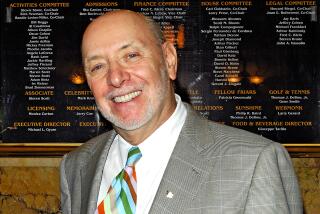Sirius gives Stern, agent $83-million stock bonus
- Share via
Howard Stern is making some Sirius money on the first anniversary of his satellite radio premiere.
The shock jock on Tuesday became the stock jock with the disclosure that he and his agent were awarded $82.9 million in Sirius Satellite Radio Inc. shares as a bonus for helping the company exceed a subscriber forecast made when he was lured away from over-the-air radio.
Stern took his act to satellite, enticed by the lucrative payday and a lack of censorship after bruising indecency battles with both the Federal Communications Commission and skittish radio executives. His bits so far have included putting a grandmother on a sex toy, parading strippers through his Manhattan studio and persuading the Dixie Chicks to reveal intimate details about their sex lives.
Analysts believe Stern is worth the extra money, which is on top of the $500 million over five years promised in his contract.
“Howard Stern is getting paid a stupendous, phenomenal, astronomical amount of money,” said Craig Moffett, an analyst with Sanford C. Bernstein & Co., in an e-mail. “But at the end of the day, Sirius will make money on the Howard Stern deal, and so will the shareholders.”
Shares of New York-based Sirius fell a nickel to $3.71.
Stern and agent Don Buchwald will receive 22.1 million shares of common stock because Sirius exceeded a 2004 target of 3.5 million subscribers by more than 2 million. Stern was also awarded more than $200 million in Sirius stock in January 2006 because the company met agreed-upon targets before Stern’s show even premiered.
“We are very pleased that our investment has dramatically paid off,” said Sirius Chief Executive Mel Karmazin, who helped make Stern a national radio star at Infinity Broadcasting.
Sirius originally said that it needed 1 million additional subscribers to make the Stern deal profitable, and some analysts put the number as high as 2 million. Since signing up Stern in 2004, Sirius has seen its subscriptions, which cost about $13 a month, soar from less than 700,000 to more than 6 million. Last year alone, the service grew its subscriber base by 82%.
But despite this growth, neither Sirius nor its competitor XM Satellite Radio Holdings Inc., which ended 2006 with 7.63 million subscribers, has yet posted a quarterly net profit because of high expenses. Although Sirius has added subscribers at a faster rate than XM, the company’s shares have fallen by 43.5% from a year ago.
Both companies lowered subscriber forecasts at the end of the year because of lower-than-expected retail sales.
The stock slipped because analysts’ expectations were extremely high last year, Moffett said. Though satellite radio is “one of the most successful new technologies in history,” analysts are not sure how the demand will play out.
This might depend on the possibility of a merger between XM and Sirius. Analysts Kit Spring and John Wren with Stifel Nicolaus said in the fall that the probability of this merger was 75% and such a deal could create $7 billion in shareholder value.
Sirius and XM have both beefed up their content, with XM featuring Bob Dylan and Oprah Winfrey while Sirius signed Martha Stewart and Jimmy Buffett.
But it will take more than big-name talent to become profitable, said David Bank, an analyst with RBC Capital Markets.
Although Stern helped make Sirius a viable business, “the emphasis on satellite radio growth is really going to be on the manufacturer side,” Bank said.
To continue subscriber growth, Sirius needs to strike deals with more automakers to get its radios into more cars.
Both companies are still losing money because of expenses related to acquiring new listeners, although both reported positive free cash flow for the first time in the last quarter of 2006.
The positive cash flow was largely the result of holiday sales, said Laura Martin, senior media analyst with Soleil/Media Metrics.
But, Martin said, the fact that Sirius could report this even without the addition of a new radio personality as big as Stern “underscores the health of consumer demand for the satellite radio product.”
More to Read
The biggest entertainment stories
Get our big stories about Hollywood, film, television, music, arts, culture and more right in your inbox as soon as they publish.
You may occasionally receive promotional content from the Los Angeles Times.











